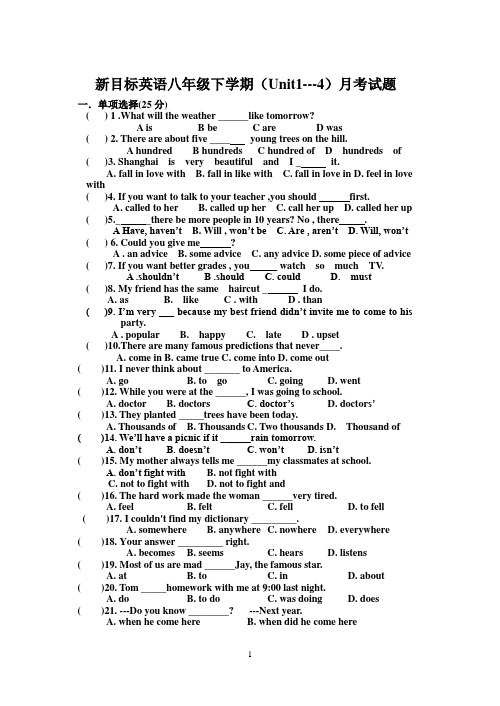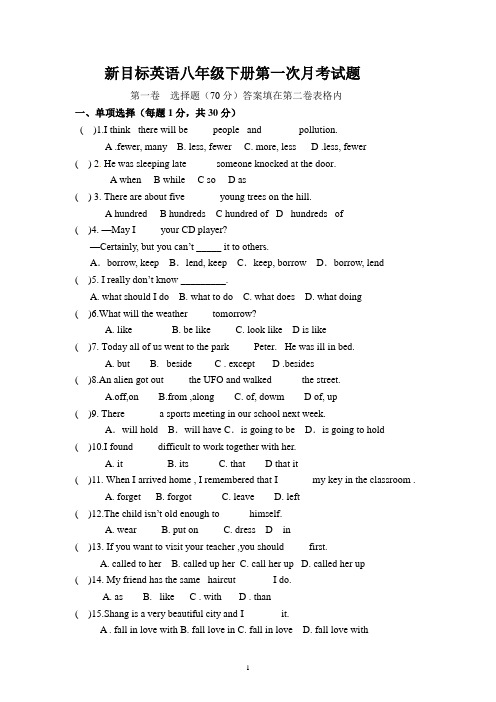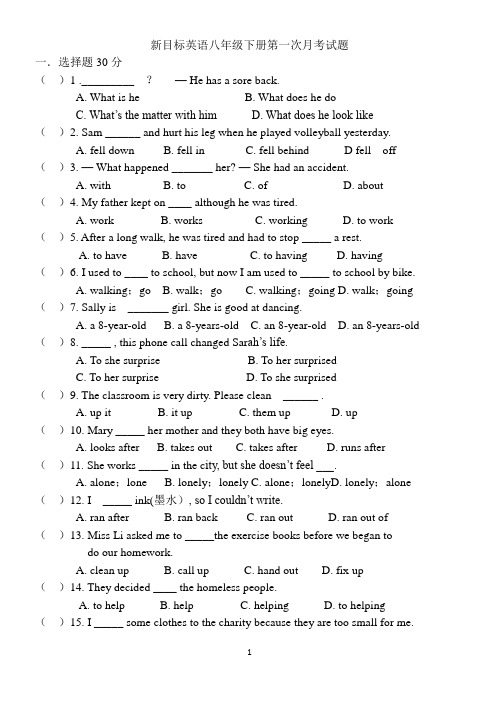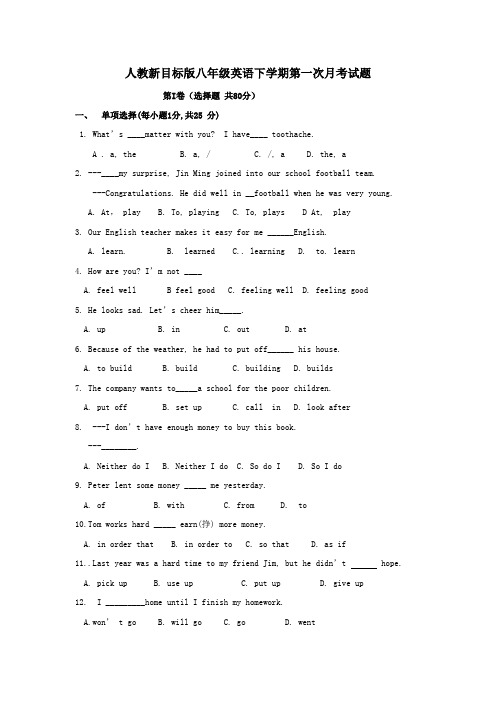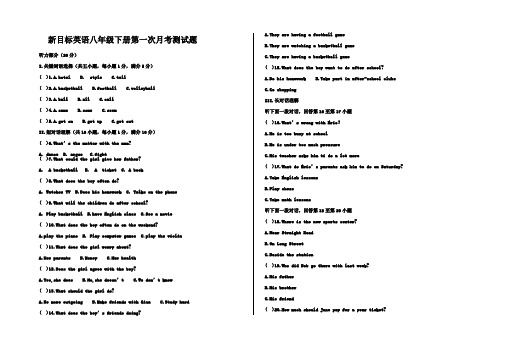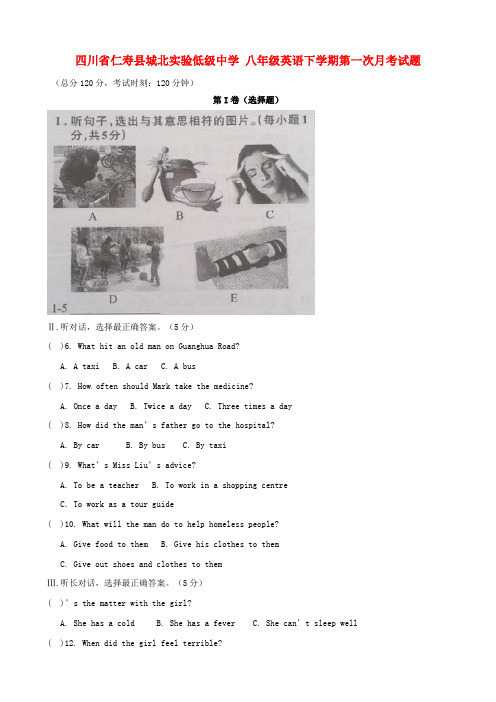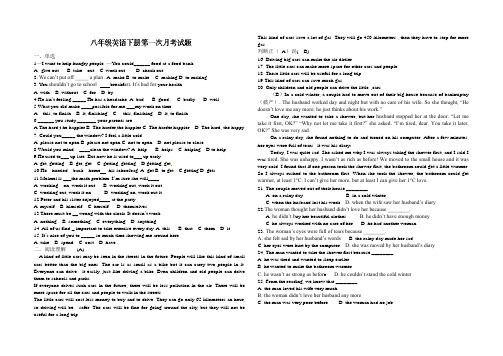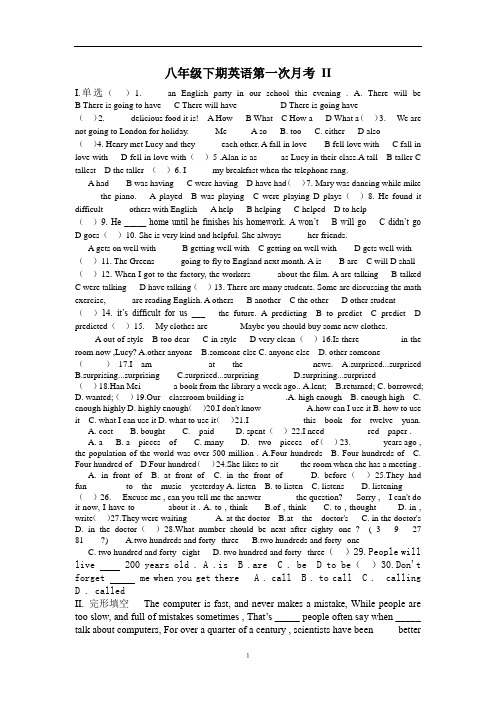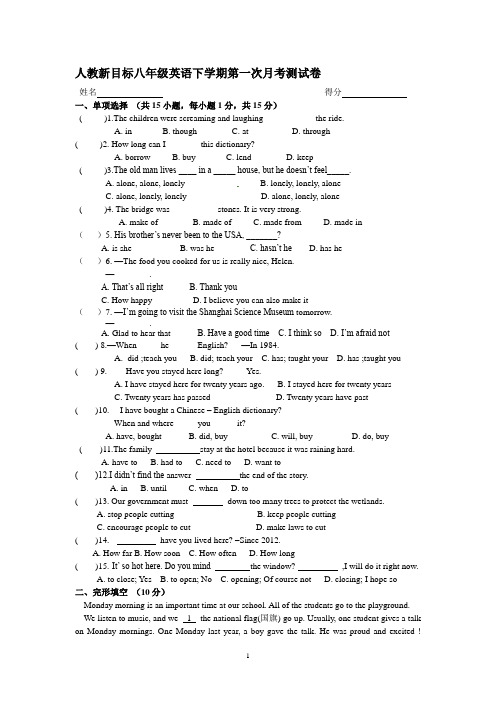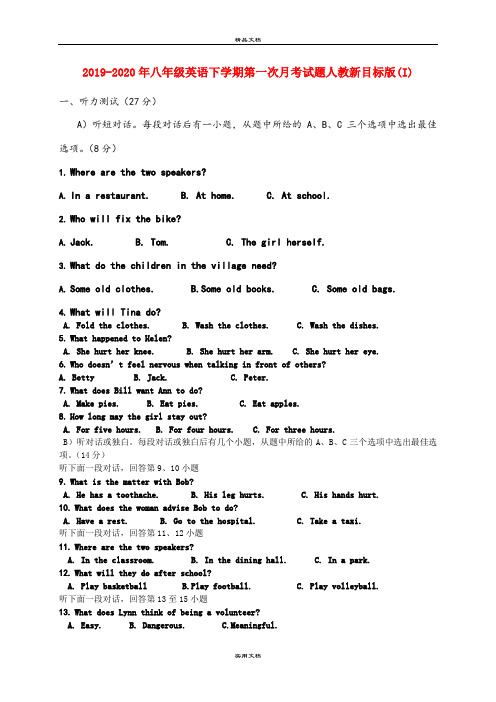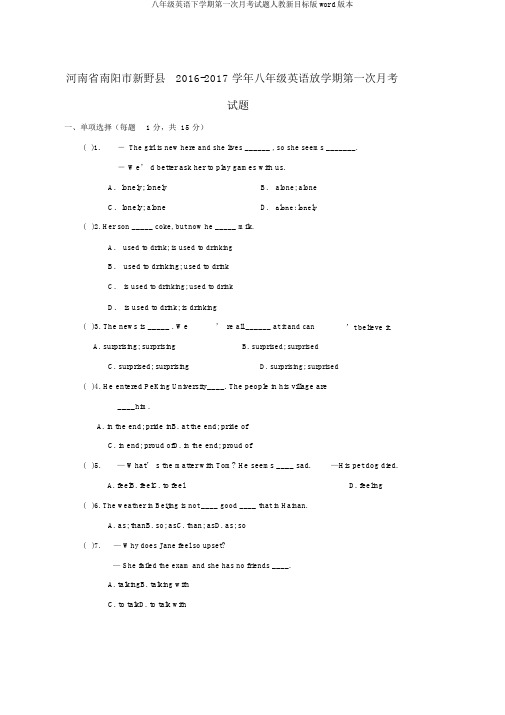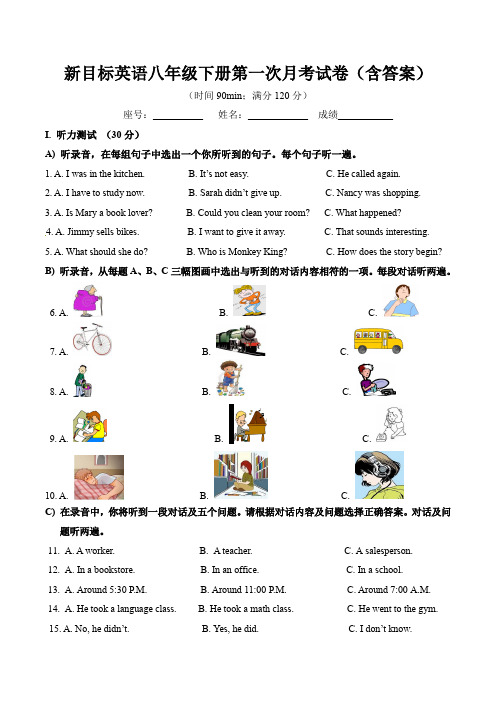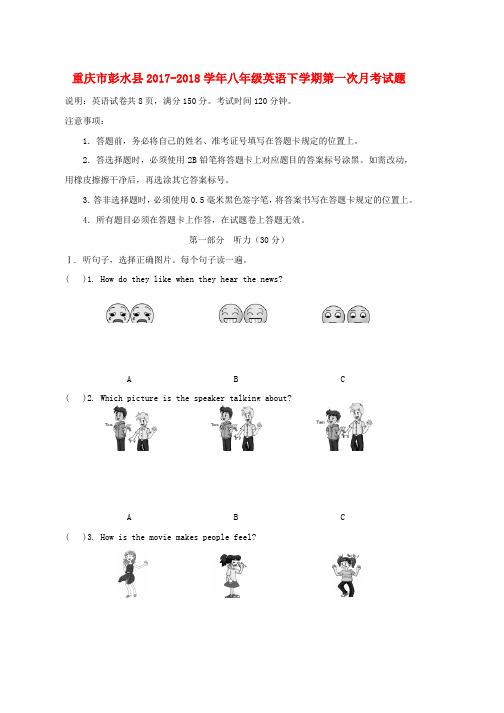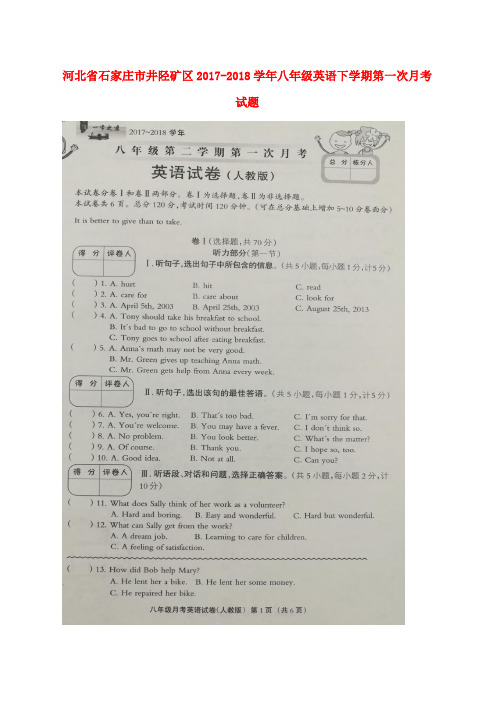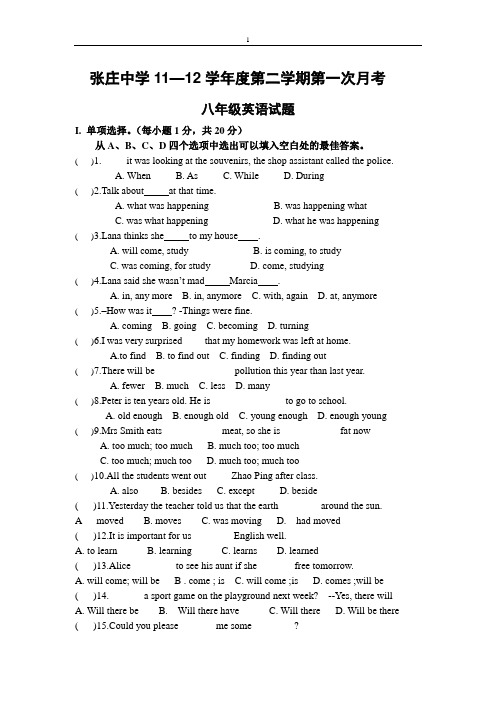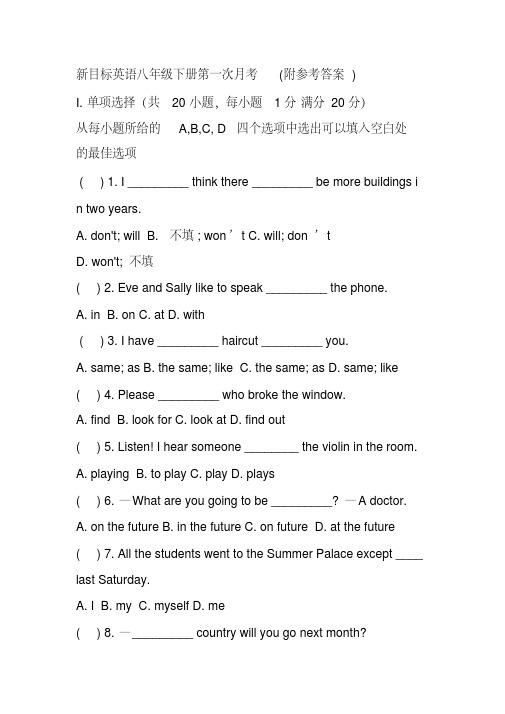人教新目标八年级英语下学期第一次月考测试卷姓名得分一、单项选择(共15小题,每小题1分,共15分)( )1.The children were screaming and laughing ___________ the ride.A. inB. thoughC. atD. through( )2. How long can I _______ this dictionary?A. borrowB. buyC. lendD. keep( )3.The old man lives ____ in a _____ house, but he doesn’t feel_____.A. alone, alone, lonelyB. lonely, lonely, aloneC. alone, lonely, lonelyD. alone, lonely, alone( )4. The bridge was __________ stones. It is very strong.A. make ofB. made ofC. made fromD. made in()5. His brother’s never been to the USA, _______?A. is sheB. was heC. hasn’t heD. has he()6. —The food you cooked for us is really nice, Helen.—________.A. That’s all rightB. Thank youC. How happyD. I believe you can also make it()7. —I’m going to visit the Shanghai Science Museum tomorrow.—________.A. Glad to hear thatB. Have a good timeC. I think soD. I’m afraid not( ) 8.—When_____ he ______English? —In 1984.A.did ;teach youB. did; teach yourC. has; taught yourD. has ;taught you ( ) 9. ----- Have you stayed here long? -----Yes. _________A. I have stayed here for twenty years ago.B. I stayed here for twenty yearsC. Twenty years has passedD. Twenty years have past( )10. ---I have bought a Chinese – English dictionary?---When and where_____ you _____ it?A. have, boughtB. did, buyC. will, buyD. do, buy( )11.The family stay at the hotel because it was raining hard.A. have toB. had toC. need toD. want to( )12.I didn’t find the answer the end of the story.A. inB. untilC. whenD. to( )13. Our government must down too many trees to protect the wetlands.A. stop people cuttingB. keep people cuttingC. encourage people to cutD. make laws to cut( )14.- have you lived here? –Since 2012.A. How farB. How soonC. How oftenD. How long( )15.-It’ so hot here. Do you mind the window?- ,I will do it right now.A. to close; YesB. to open; NoC. opening; Of course notD. closing; I hope so二、完形填空(10分)Monday morning is an important time at our school. All of the students go to the playground. We listen to music, and we 1 the national flag(国旗) go up. Usually, one student gives a talk on Monday mornings. One Monday last year, a boy gave the talk. He was proud and excited !When I saw him, I wanted to have a try, too. Can I really do it?Last week, our teacher said our class should give the talk. My teacher 2 me, "I know you want to have a try. Next Monday, you can give the talk. Go and write something down. 3_ for it, I'm sure you'll do well.""Thank you ," I answered, It was such a great 4 for me ! When I got home, I was excited. I wrote two pages for the talk. I read them again and again. When I read, I asked my parents 5 . I wanted to make my teacher happy.Monday morning came. I began to feel 6 . When did I last give a talk to so many people, Never! This was my first time. Could I really do it? Maybe I couldn't finish the talk.When I got to school, we all went out to playground. I stood in front of everyone. I opened my mouth, but I couldn't say anything."Take it easy," I said to 7 . " Don't be nervous. You can do it." Just then, I looked down at everyone. I saw about 1,000 eyes. They were all looking at me ! I nearly couldn't 8 .I looked at their eyes more carefully. Their eyes were saying , "You can do it! Don't be afraid, just talk !"I took a big 9_. Then I began to talk. It wasn't hard. It was easy. I don't know 10 I finished my talk. But I did it. I felt so good that day. I showed myself to everyone what I can do. ( ) 1. A. watch B. see C. notice D. look at( ) 2. A. told B. asked for C. said to D. showed( ) 3. A. Look out B. Come on C. Take care D. Get ready( ) 4. A. chance B. news C. time D. message( ) 5 A. to listen to B. to listen C. listen to D. listen( ) 6. A. excited B. happy C. nervous D. surprised( ) 7. A. me B. my class C. myself D. my parents( ) 8. A. sit down B. cry C. look D. stand up( ) 9. A. breath(呼吸) B. smile C. mouth D. figure(人物)( ) 10. A. when B. how C. why D. whether三、阅读理解(每小题2分,计30分)AAll the cities are quite the same. Living in a modern Australian city is not very different from living in an American city. But there are some differences on farms.In many parts of the world, farmers and their families live in villages or towns. In the United States, each farm family lives in its own fields. Usually their neighbors live far away. It's hard for them to see each other on weekdays. Their children take school buses to the nearest schools. These schools are only for the farm families in this area (地区). In some areas, there are small schools for a few farm families, and the children walk to schools.Life keeps changing for everyone. So do farmers. Today there are cars, good roads, radios, television sets and there are modern machines for farming. All of these are changing farm life. ( )1. Living in a modern Australian city is almost _________ living in an American city.A. different fromB. comfortable likeC. as important asD. the same as( )2. Usually farm families live in _________.A. big citiesB. the countryC. the islandD. every town( )3. The farmers in _________ can visit each other easily on weekdays.A. the worldB. AmericaC. AustraliaD. the United States( )4. How do the farmers' children go to school?A. They ride their bikes to schools.B. They only walk to schools.C. They can go to schools in a car.D. They can take school buses or walk to schools. ( )5. What about the farmers' life now?A. Their life is poor.B. Their life is changing.C. They don't like their life.D. Their life is comfortable.BSarah left school at eighteen, went to college and then worked at a computer company. Four years later, she got a new job as a manager in British Airways. This is what she told us about her job:―My office is at Heathrow Airport, but I spend 60% of my time in the air. I teach air-hostesses (空姐)and help them with any problem. I also go to lots of meetings. My hours are usually from 8 a.m. to 4 p.m. but sometimes I work from 1 p.m. to 9 p.m. At work, the first thing I do is check plane times on my computer and then I speak with some of the air-hostesses.Sometimes I go on long flights to check how the air-hostesses are doing. That’s my favourite part of the job, but I like office work, too. Traveling can be hard work. When I get back from a long trip, all I can do is to eat something and th en go to bed! I don’t make much money, but I’m happy with British Airways and want to stay there and continue to travel.‖( ) 6. Sarah’s first job was .A. at a collegeB. at a computer companyC. in British AirwaysD. at Heathrow Airport ( ) 7. Sarah does most of her work .A. in meetingsB. in the computer roomC. in the officeD. in airplanes( ) 8. Most days, Sarah starts work at .A. 8 a.m.B. 1 p.m.C. 4 p.m.D. 9 p.m.( ) 9The first thing Sarah does after a long trip is to .A. go to bedB. have a mealC. go to a meetingD. go to the office ( ) 10. Sarah would like to .A. make more moneyB. stop travelingC. go to college againD. stay in the same jobCWhen you are readi ng something in English, you may often meet with a new word. What’s the best way to know it?You may look it up in the English-Chinese dictionary. It will tell you a lot about the word: the pronunciation, the Chinese meaning and how to use the word. But how can you know where the word is thousands of English words? How to find it in the dictionary both quickly and correctly? First, all the English words are arranged(安排) in the letter order. In the dictionary you can first see the words beginning with letter A, then B, C, D…. That means, if there are two words ―desert‖ and ―pull‖, ―desert‖ will be certainly before ―pull‖. Then if there are two words both beginning with the same letter, you may look at the second letter. Then the third, the fourth… For example, ―pardon‖ is before ―plough‖, ―judge‖ before ―just‖, etc.Do you understand how to look up in the dictionary?The dictionary will be your good friend. I hope you’ll use it as often as possible in your English study.()11. This passage is about______.A. new words in writingB. different dictionariesC. the best way of readingD. using an English-Chinese dictionary()12. In the dictionary you may not find_______.A. how to pronounce the wordB. the spelling of the wordC. who used the word firstD. how to use the word()13. In an English-Chinese dictionary, the last word______.A. begins with ZB. begins with AC. is a short oneD. is not often used()14. Which group of words is in the right order in an English-Chinese dictionary?A. perhaps, produce, plentyB. straight, subject, surpriseC. century, center, businessD. foreign, entrance, headache()15. In the passage the writer tries to tell us that_______.A. we have to use a dictionary when we read something in EnglishB. an English-Chinese dictionary can tell us everything about a wordC. an English-Chinese dictionary can help us a lot in our English studyD. all English-Chinese dictionary are the same四、词汇(10分)根据句意、中文提示写出单词。
